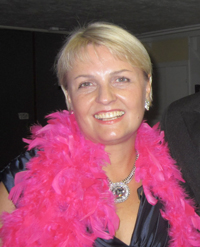by Robert Rollin
This
Three talented singers led the male dominated cast: baritone John Grey Watson, a Cleveland Institute of Music-trained Northeast Ohio native, was excellent as Figaro. His light baritone range was appropriate to the shrewd, politically savvy barber, who helps thwart the aging Dr. Bartolo’s plans to marry young Rosina, his ward. His experience on an Oberlin-sponsored Italian opera tour no doubt helped his impressive fluidity. He displayed great poise and comfort throughout the opera, from his very opening first-scene aria. The show hinges on his ability to make the canny barber seem real, and he did this with great success.
Tenor Matthew Miles, who studied at Youngstown State’s Dana School of Music and the University of Southern California Vocal Arts Program, was very proficient as Count Almaviva, Rosina’s suitor and husband to be. Beyond his lovely light tenor quality, he seemed to take great pleasure in deceiving Dr. Bartolo as he enthusiastically pursued the lovely Rosina.
Bass Jason Budd, a Dana School of Music-trained laureate of several important international competitions who has had successful exposure nationally, was outstanding as Dr. Bartolo, not only because of his beautiful vocal quality, but because his exceptional talent for the comic timing was so important in the role as well.
European-trained Opera Circle director and lead soprano Dorota Sobieska brought the sparkling coloratura role of Rosina to life. Her high range coloratura was stunning as usual, and she tossed off the technically demanding role with great flair. Her low register passages were not quite up to her usual dynamic level, and her lively and wide-ranging part was at times covered by the orchestral accompaniment.
Bass Timothy J. Bruno, a Cincinnati Conservatory graduate and veteran of some eighteen roles, was very successful at bringing out Don Basilio’s quirky personality. His lovely dark color added to the effect. Soprano Diana Farrell, with degrees from the Cleveland Institute of Music and the Dana School of Music, has an equally fine voice and depicted Berta beautifully. Baritone Joel Rhoads was effective as Fiorello, but Baritone Michael Robert’s pinched vocal sound hampered his role as the Sergeant. The ample choral sections were excellent. More elaborate sets will have to await a more practical theatrical location.
Even in the case of main stage metropolitan opera companies, the quest for rapid theatrical flow can sometimes hurt comic movement. This production had some recurring balance problems and a few ensemble difficulties. Conductor Robert Conquist, though rightfully striving for the requisite, rapidly moving action, several times pushed tempi a bit too much. The resultant ensemble problems, though relatively rare, intruded on the opera’s dramatic impact. The rather odd sounding piano used to accompany recitative was out of tune enough to call attention to itself. The orchestral accompaniment periodically had noticeable intonation problems.
Rossini’s knack of pacing his scenes so masterfully is precisely what makes the Barber of Seville such a wonderful comic opera experience. The Opera Circle cast excelled here especially. Rossini always starts small, with a duet or trio, and gradually builds up dramatic urgency and musical excitement as the scene progresses to quintets and sextets with full onstage chorus support. This was especially effective for both acts’ second scene endings. Despite some technical struggles, the production emerged as excellent and showed great teamwork. The soloists truly shone in the challenging ensembles. We look forward to the company’s upcoming spring Rigoletto production.
Published on ClevelandClassical.com February 26, 2013
Click here for a printable version of this article.



